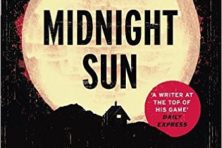Excerpt of “Midnight Catch”
- Share
- Tweet
- Pin
- Share
Suddenly Ainsley Harper had a big story, whether she wanted it or not. Four days after Jim’s arrest, she dragged a heavy wooden chair up to the door of his cell and took in the bare gray and green walls and high barred window.
“The district attorney’s building a case against you, mostly on hearsay so far.”
The pull-down bunk was too far away for polite conversation, so the prisoner stood before her. He planted his feet and folded his arms like a soldier at parade rest, but apparently that seemed too severe, so he shifted his weight to one foot and rested a hand on the bars.
“That Luger might not be through killing people,” he said. “Don’t write that down.”
She hadn’t yet taken out her notebook. “Any idea how it got in your room?”
“Somebody wanted to frame me.”
“Because of your politics?”
“Well, in my case it’s hard to separate the political from the personal.”
“The personal? Do you have any enemies here in town?”
“Pretty clearly.”
“I mean do you know who they are?”
“Not exactly.”
She came to the edge of the chair. “You do have enemies here though. Plural. What can you tell me about them?”
“Nothing.” Seeing her frustration, he told her more. “All right, here it is. But this is off the record too.”
She closed the notebook and crossed her legs. “I’ve pretty much given up on a story with any substance for now.”
He told her about the three men at the church, adding, “One of them called me Red. So it wasn’t just some guys out for a lark.”
“So if you could find them….”
“Maybe we’d have something.”
“In the meantime, the least they could do is let you have your guitar.”
“Don’t be so sure. I could use a string to strangle somebody.” He came toward her and curled his fingers around the bars. “You see? I’m starting to think like them. I tried reading to the other prisoners but that didn’t go so well.”
“What about your politics, Jim? What’s this revolution you’ve been talking about?”
“You’ve been doing your homework.”
“It’s a small town. Word gets around. What about the revolution? Do you espouse the violent overthrow of the U.S. government?”
“If the government is going to change as much as it needs to, violence might be unavoidable. Do I want it to happen that way? No, I don’t. But look at the real changes this country has undergone, the radical improvements. The abolition of slavery and the subordination of the states to the central government—that took a civil war. The throwing off of the government of taxation without representation—that took a revolution. Even the Haymarket massacre back in the eighties made its point and had a positive effect. Maybe this time we’ll do it right. I hope so.”
“But now—don’t you think that the government represents the will of the people?”
He pushed his hands against the bars. “Ever heard of Victor Berger?”
She thought for a moment. “No, I don’t believe so.”
“He was a socialist, elected repeatedly by Wisconsin’s fifth congressional district right up until last year, and twice the U.S. House of Representatives refused to seat him just because he opposed our entry into the war. So, no, the government doesn’t necessarily represent the will of the people.”
She opened up the notebook again. “Is the Luger the murder weapon?”


